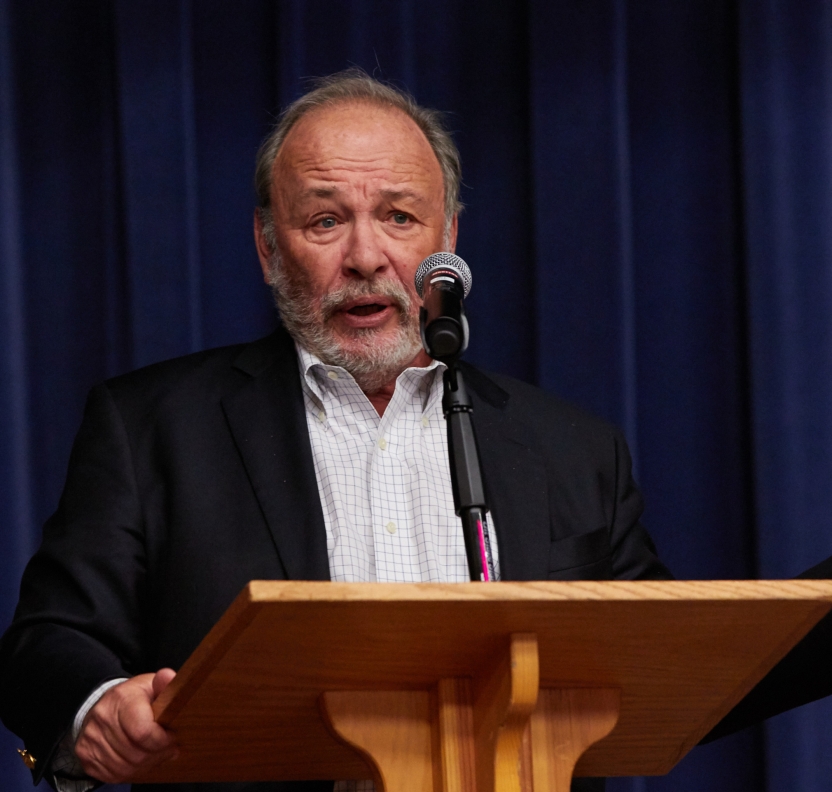Veteran Journalist Joe Klein Looks at State of U.S. Democracy

MIDDLEBURY, Vt. — Veteran journalist and author Joe Klein said American democracy is not inevitable “because you can’t do democracy without citizenship.”
Speaking at Middlebury College on April 18 for the Robert W. van de Velde ’75 Memorial Lecture Series, the former political columnist for Time and author of the acclaimed novel Primary Colors (Random House, 1996), contended that 70 years of relative peace and prosperity in this country, combined with “the marketization of politics,” has caused Americans to lose “the habits of citizenship.”
“When was the last time you heard a politician talk about your responsibility as citizens?” Klein asked. Presidents Kennedy [“Ask not what your country can do for you…”] and Clinton [AmeriCorps] tried to instill a sense of citizenship, but politics today is about “selling to the niche” and “over the course of time it has become increasingly difficult for our leaders to talk in common terms and bring us together as Americans.”
The generations that came after World War II “have lost the habits of citizenship. We didn’t follow the news as closely as our parents did, and our children didn’t follow the news as closely as we did. There were all these marketing options and all these other things you could do.” For example, Klein said, in the 1950s and 60s there were just three flavors of ice cream and three networks on television. “Today we have an explosion of options. And we have the Internet.”
“Here is why I believe that democracy is under stress and perhaps is not inevitable. Because you can’t do democracy without citizens,” said Klein. He said that being a citizen means more than just yelling at the TV or ranting online. He was also quick to point out the media’s role in the decline of citizenship in America with the proliferation of news channels, the 24-hour news cycle, and the “desperate efforts” to grow viewership via “conspiracy theories,” “titillation,” and outright “yelling” at audiences.
“The most fundamental fact about the Affordable Care Act was never mentioned” during the last presidential election, Klein said. The media talked about pre-existing conditions or coverage for children until age 26, but “most Americans never found out that the ACA was about making health care accessible to the working poor. It was social justice for people who work hard every day and couldn’t get health insurance from their employer, or were self-employed. In that way, we members of the media made a mistake.”
To research his latest book Charlie Mike (Simon & Shuster, 2015) Klein spent a great deal of time with returning war veterans. And in the last segment of his talk, the University of Pennsylvania graduate shared what he learned from those servicemen and women.
“Ninety percent of [returning veterans] say they want to continue serving in their communities when they get home. As coaches, as teachers, as cops, as firefighters, as city councilors, and as politicians… And their posttraumatic stress is a rational reaction to their seeing unimaginable things and their doing unimaginable things. But it is also a reaction to something else as well.
“It is a reaction to their loss of community. When troops are serving overseas, they wake up every day with a sense of purpose. And that’s mostly to protect the people on their left and on their right. It is amazing how something so powerfully good can come out of such stupid unjust wars. But that sense of community they had evaporated when they came home because they came home to a society that asked nothing of them.”
In researching Charlie Mike, Klein realized that returning veterans are a lot like the elderly. Both groups have lost their sense of community, as well as a measure of their physical and mental capacity, and yet both groups can flourish by reaching out and helping other people.
“I am here today to argue to you that as a society we have been living on ‘Camp Couch’ for too long,” Klein declared. “We need to have stronger communities than we now have, and we need to be better citizens than we are now. It is no accident that a great many people in the [military’s] officer corps were also classics minors or philosophy minors in college. They see citizenship in a way that Aristotle and Socrates and Plato saw citizenship.
“Citizenship is not a passive act. It is not just going in and voting. It is being an active participant in your community, and the next natural step in this would be to make some form of national service mandatory. But I don’t think that’s true. This is not a mandatory kind of country. We have seen how hard it is to mandate anything in the United States.
“But what should happen, especially for our elite, especially for the kind of kids who go to Middlebury, is that 10 years from now, when you go to a job interview in whatever profession you choose, the first question asked should always be ‘Where did you serve?’ and if you cannot answer that in the affirmative, then you need to be viewed by society as someone who is not-quite-a-citizen.”
Klein was introduced to the audience of about 150 community members by James Ralph, the Rehnquist professor of American history and culture and dean of faculty development and research. The van de Velde lecturer spoke for about 45 minutes in Dana Auditorium and took questions from the audience – on what young people should do, on the Trump Presidency, on journalism, on the Clintons – for another half an hour.
The van de Velde Lecture Series is supported by the van de Velde family and recent speakers include Bob Herbert and Rachel Donadio of the New York Times, David Wessel of the Wall Street Journal, and Jonathan Alter of Newsweek.

